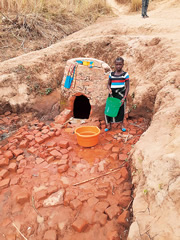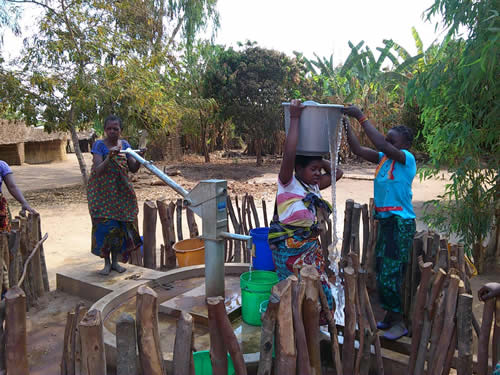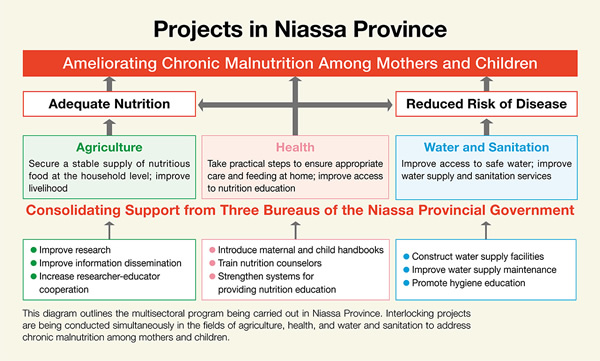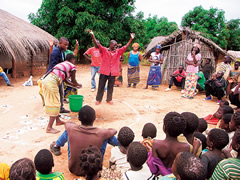Feature
Nutrition for Growth
Multisectoral Efforts (Health / Food and Agriculture / Water/Sanitation)
Water Projects Interlock with Health and Agriculture Efforts
JICA continues to cooperate to provide a stable supply of safe water in Mozambique's northern province of Niassa. Agriculture and health-related projects are also underway, and a comprehensive effort has begun to improve nutrition.

Republic of Mozambique
Sustainable Cooperation to Provide Safe Water

[Before] A girl drawing water at the old village well.

[After] A deep well with a hand pump, built thanks to technical cooperation. Now the villagers have easy access to safe water.
In 2010, the government of Mozambique formulated its National Rural Water Supply and Sanitation Program, which was intended to increase water supply coverage in the country to 70 percent by 2015. This figure proved unattainable, with rural coverage remaining at 42 percent, and with the northern province of Niassa still having the lowest coverage at 37 percent. The government developed another five-year plan in 2015, designating the province as a region of particular importance.
One factor holding back better coverage is the lack of ability to operate and maintain facilities. To solve this, JICA has been supporting the construction, management, and maintenance of hand-pumped wells in villages in Niassa Province since 2013.
Yokogi Shoichi from Nihon Techno Eng Co., Ltd., leader of the project team, explained the situation.
"Our survey revealed that many facilities had broken hand pumps and villagers would have to spend a whole day to buy spare parts in the provincial capital, Lichinga. So we made spare parts available to villagers locally, trained repair technicians, and strengthened the government officers'monitoring system. We also built improved toilet facilities in primary schools, and lectured to both teachers and students on the correct way to use these facilities to improve water and sanitation."
The new grant aid project plans to install new water pipeline systems in the urban areas of four districts, and 25 hand pumps in villages in each district. "We would like to make safe water accessible to more people," said Yokogi, who is also preparing for the new project.
A Three-pronged Approach to End Malnutrition

This diagram outlines the multisectoral program being carried out in Niassa Province. Interlocking projects are being conducted simultaneously in the fields of agriculture, health, and water and sanitation to address chronic malnutrition among mothers and children.
To address chronic malnutrition among mothers and children in Niassa Province, JICA is not only implementing this water and sanitation project but also undertaking technical cooperation projects in the fields of agriculture and health.
"In the Initiative for Food and Nutrition Security in Africa (IFNA), JICA emphasizes the importance of collaborative work in different fields in a given region simultaneously. This project in Niassa Province is one good example of this new approach," said Matsunoshita Minoru, who works for JICA's Rural Development Department.
A survey was carried out jointly in 2019 by these projects, and practical efforts are being solidified in various fields, as outlined in the diagram above. In several villages where hand pumps had been installed through the water project, new activities will be conducted in conjunction with other health and agriculture projects.
Yokogi is expecting a positive effect from this collaboration for the water project. "If the donor-built hand pump facilities break down, there is a risk that people will go and draw water from unsanitary sources like rivers. But if we can work on this kind of issue from three different fields at the same time, then we can get the villagers to understand that safe water contributes to children's nutrition. They'll be more inclined to repair the wells, and this should enable the facilities to be used sustainably."

Awareness campaigns for sanitation and hygiene were conducted in villages.
Matsunoshita is keen to face the new challenge. "This kind of cooperation is where JICA's strengths really shine. JICA has knowledge and a network gained from working on projects in many different fields. If we can cooperate in three different fields, then we should be able to make a significant impact. Since September 2019, we have been dispatching experts who emphasize multisectoral approach to promote better nutrition in the villages, and we are planning to improve projects in each field. The real progress is from here on."




scroll